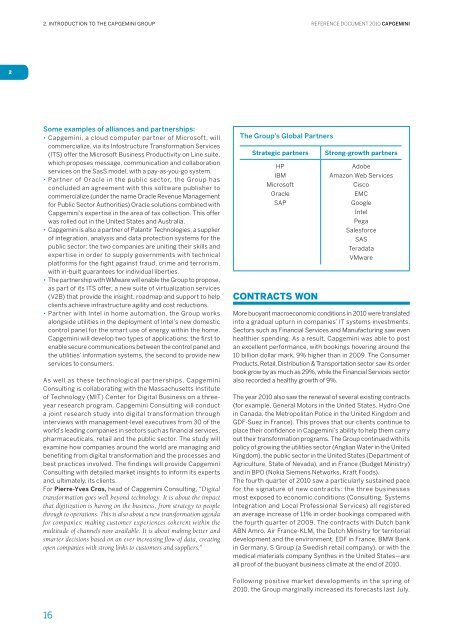INTRODUCTION TO THE CAPGEMINI GROUP
INTRODUCTION TO THE CAPGEMINI GROUP
INTRODUCTION TO THE CAPGEMINI GROUP
Create successful ePaper yourself
Turn your PDF publications into a flip-book with our unique Google optimized e-Paper software.
2<br />
2. <strong>INTRODUCTION</strong> <strong>TO</strong> <strong>THE</strong> <strong>CAPGEMINI</strong> <strong>GROUP</strong><br />
Some examples of alliances and partnerships:<br />
�� Capgemini, a cloud computer partner of Microsoft, will<br />
commercialize, via its Infostructure Transformation Services<br />
(ITS) offer the Microsoft Business Productivity on Line suite,<br />
which proposes message, communication and collaboration<br />
services on the SasS model, with a pay-as-you-go system.<br />
�� Par tner of Oracle in the public sector, the Group has<br />
concluded an agreement with this software publisher to<br />
commercialize (under the name Oracle Revenue Management<br />
for Public Sector Authorities) Oracle solutions combined with<br />
Capgemini’s expertise in the area of tax collection. This offer<br />
was rolled out in the United States and Australia.<br />
�� Capgemini is also a partner of Palantir Technologies, a supplier<br />
of integration, analysis and data protection systems for the<br />
public sector: the two companies are uniting their skills and<br />
expertise in order to supply governments with technical<br />
platforms for the fight against fraud, crime and terrorism,<br />
with in-built guarantees for individual liberties.<br />
�� The partnership with WMware will enable the Group to propose,<br />
as part of its ITS offer, a new suite of virtualization services<br />
(V2B) that provide the insight, roadmap and support to help<br />
clients achieve infrastructure agility and cost reductions.<br />
�� Partner with Intel in home automation, the Group works<br />
alongside utilities in the deployment of Intel’s new domestic<br />
control panel for the smart use of energy within the home.<br />
Capgemini will develop two types of applications: the first to<br />
enable secure communications between the control panel and<br />
the utilities’ information systems, the second to provide new<br />
services to consumers.<br />
As well as these technological partnerships, Capgemini<br />
Consulting is collaborating with the Massachusetts Institute<br />
of Technology (MIT) Center for Digital Business on a threeyear<br />
research program. Capgemini Consulting will conduct<br />
a joint research study into digital transformation through<br />
interviews with management-level executives from 30 of the<br />
world’s leading companies in sectors such as financial services,<br />
pharmaceuticals, retail and the public sector. The study will<br />
examine how companies around the world are managing and<br />
benefiting from digital transformation and the processes and<br />
best practices involved. The findings will provide Capgemini<br />
Consulting with detailed market insights to inform its experts<br />
and, ultimately, its clients.<br />
For Pierre-Yves Cros, head of Capgemini Consulting, “Digital<br />
transformation goes well beyond technology. It is about the impact<br />
that digitization is having on the business, from strategy to people<br />
through to operations. This is also about a new transformation agenda<br />
for companies: making customer experiences coherent within the<br />
multitude of channels now available. It is about making better and<br />
smarter decisions based on an ever increasing flow of data, creating<br />
open companies with strong links to customers and suppliers.”<br />
16<br />
The Group’s Global Partners<br />
REFERENCE DOCUMENT 2010 <strong>CAPGEMINI</strong><br />
Strategic partners Strong-growth partners<br />
HP<br />
IBM<br />
Microsoft<br />
Oracle<br />
SAP<br />
CONTRACTS WON<br />
Adobe<br />
Amazon Web Services<br />
Cisco<br />
EMC<br />
Google<br />
Intel<br />
Pega<br />
Salesforce<br />
SAS<br />
Teradata<br />
VMware<br />
More buoyant macroeconomic conditions in 2010 were translated<br />
into a gradual upturn in companies’ IT systems investments.<br />
Sectors such as Financial Services and Manufacturing saw even<br />
healthier spending. As a result, Capgemini was able to post<br />
an excellent performance, with bookings hovering around the<br />
10 billion dollar mark, 9% higher than in 2009. The Consumer<br />
Products, Retail, Distribution & Transportation sector saw its order<br />
book grow by as much as 29%, while the Financial Services sector<br />
also recorded a healthy growth of 9%.<br />
The year 2010 also saw the renewal of several existing contracts<br />
(for example, General Motors in the United States, Hydro One<br />
in Canada, the Metropolitan Police in the United Kingdom and<br />
GDF-Suez in France). This proves that our clients continue to<br />
place their confidence in Capgemini’s ability to help them carry<br />
out their transformation programs. The Group continued with its<br />
policy of growing the utilities sector (Anglian Water in the United<br />
Kingdom), the public sector in the United States (Department of<br />
Agriculture, State of Nevada), and in France (Budget Ministry)<br />
and in BPO (Nokia Siemens Networks, Kraft Foods).<br />
The fourth quarter of 2010 saw a particularly sustained pace<br />
for the signature of new contracts: the three businesses<br />
most exposed to economic conditions (Consulting, Systems<br />
Integration and Local Professional Services) all registered<br />
an average increase of 11% in order bookings compared with<br />
the fourth quarter of 2009. The contracts with Dutch bank<br />
ABN Amro, Air France-KLM, the Dutch Ministry for territorial<br />
development and the environment, EDF in France, BMW Bank<br />
in Germany, S Group (a Swedish retail company), or with the<br />
medical materials company Synthes in the United States—are<br />
all proof of the buoyant business climate at the end of 2010.<br />
Following positive market developments in the spring of<br />
2010, the Group marginally increased its forecasts last July.















